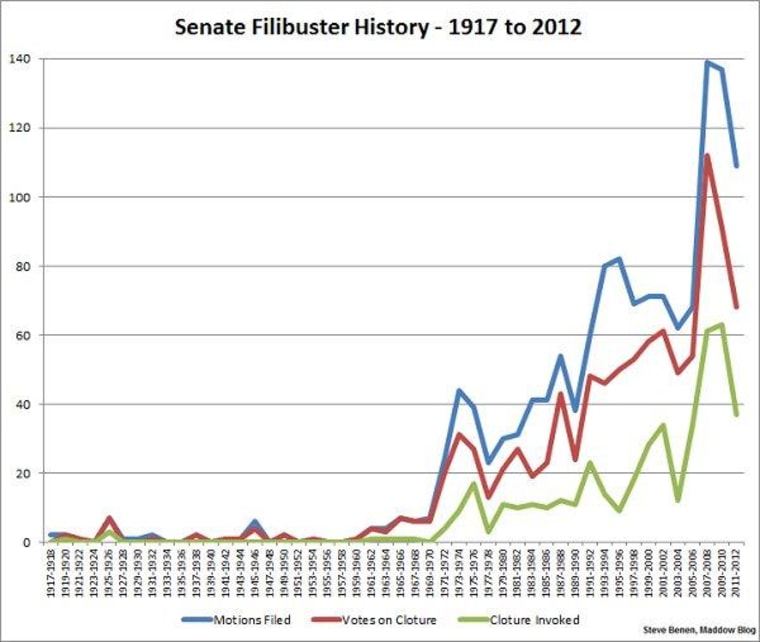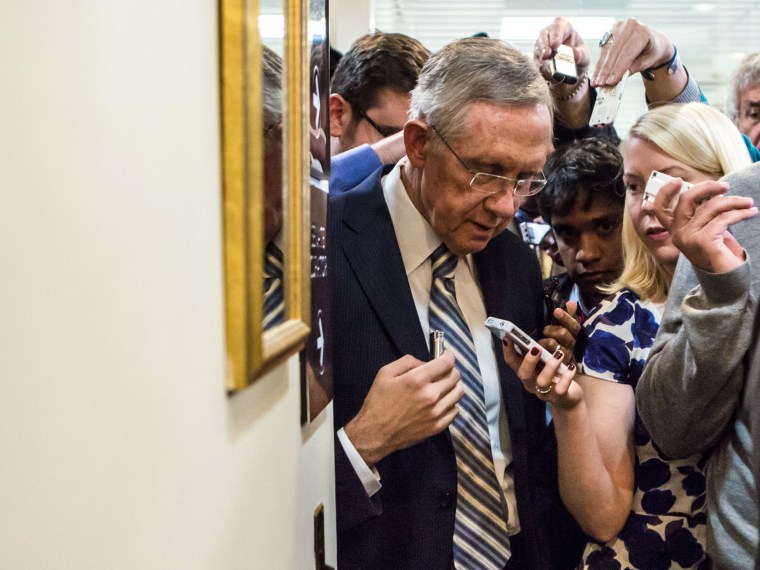Empowered by last week’s election results, Democrats could be on the cusp of taking decisive action to fix the badly broken U.S. Senate—and give a huge boost to President Obama’s agenda.
Leaders of an effort to change Senate rules to make it harder for Republicans to abuse the filibuster process say they could soon have enough support for the move.
“It’s hard to say at this point, but I think it’s looking very good,” Sen. Tom Udall of New Mexico told The Hill. And Senate Majority Leader Harry Reid, a recent convert to the cause, said last week he’d push the issue early in 2013.
All eight of the new Democratic or independent senators elected last week—when Democrats netted two Senate seats—are advocates of filibuster reform. Greg Sargent of The Washington Post last week counted 50 Senate votes in favor of reform.
In recent years, the Republican minority’s historically unprecedented use of the filibuster has meant 60 votes are now required to pass virtually any significant legislation. That's allowed the GOP to virtually paralyze government. This chart compiled by msnbc’s Steven Benen tells the story:

The devil may be in the details. Reid has said he wouldn't scrap the filibuster entirely, but would support getting rid of filibusters on the “motion to proceed,” meaning you’d no longer need 60 votes just to debate a bill. Udall and others last year introduced a measure that, among other steps, would have raised the political costs of filibustering by requiring the minority to actually hold the floor and debate, rather than simply notifying the majority of their intention to filibuster.
Reid opposed that measure, but in May, frustrated by the lastest GOP filibuster, he said he'd changed his mind.
“These two young, fine senators said it was time to change the rules of the Senate and we didn’t," Reid said on the Senate floor, referring to Udall and Jeff Merkley of Oregon. "They were right. The rest of us were wrong—or most of us, anyway. What a shame."
But in another sign of growing momentum, The New York Times editorialized in favor of reform Wednesday. “In January, at the beginning of the next session of the United States Senate, Democrats can vastly improve the efficiency of Congress and reduce filibuster abuse with a simple-majority vote,” the paper wrote. “This time they need to seize the moment.”
Still, hurdles remain. It’s no surprise that the GOP minority opposes the idea. “We hope Democrats will work toward allowing members of both sides to be involved in the legislative process — rather than poisoning the well on the very first day of the next Congress,” said Don Stewart, a spokesman for Senate Republican Leader Mitch McConnell, told The Hill.
And even some veteran, conservative Democrats, like Mark Pryor of Arkansas or Max Baucus of Montana—both of whom opposed the Udall measure last year—could also be wary. Remember how conservatives Democrats and independents were able to water down measures like Obamacare and the stimulus and portray themselves as centrist dealmakers in the process? That becomes much more difficult if Democrats only need 50 votes to pass legislation.
Had a simple majority vote sufficed during the first two years of Obama’s term, Democrats could likely have passed global warming legislation, included a public option within Obamacare, and approved a stimulus package as big as most economists said was needed to create sustained growth.
